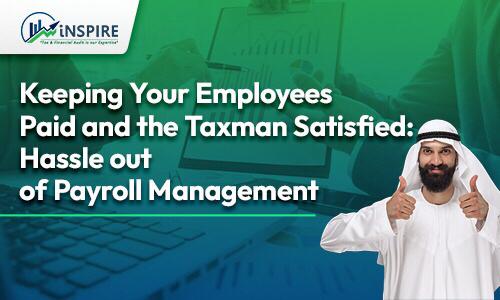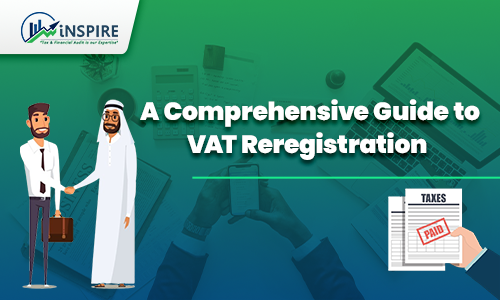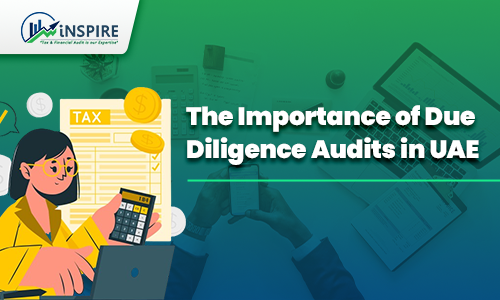
All You Need to Know About Corporate Tax in the UAE
The UAE is not alone in adopting corporate tax policies; many other countries globally have similar systems in place, including the United States, India, France, and fellow Gulf Cooperation Council (GCC)
In January 2022, the Ministry of Finance in the United Arab Emirates (UAE) announced the introduction of Corporate Tax across the country. According to the Ministry's announcement, this Corporate Tax legislation will come into effect on June 1, 2023. The implementation of Corporate Income Tax will vary depending on the financial year of individual businesses, with enforcement starting from June 1, 2023. Corporate Income Tax is a type of direct tax imposed on a company's earnings.
The UAE is not alone in adopting corporate tax policies; many other countries globally have similar systems in place, including the United States, India, France, and fellow Gulf Cooperation Council (GCC) members such as Oman, Kuwait, and Qatar. Among these nations, the UAE boasts one of the lowest corporate tax rates, set at 9%.
Furthermore, during the G7 countries meeting convened in 2021, Gulf countries agreed to a collective decision introducing a global minimum corporate tax rate of 15%.
The Federal Tax Authority will oversee the administration, collection, and enforcement of UAE Corporate Tax, while the Ministry of Finance will retain its role as the authority responsible for bilateral or multilateral agreements and international exchange of tax-related information.
Historically, the implementation of Corporate Tax has proven beneficial for countries in sustaining their economies. The introduction of corporate tax in the UAE is aimed at improving corporate governance and thereby strengthening the nation's economy. Corporate tax can be likened to a high-speed train propelling the UAE towards its strategic economic transformation.
Through the adoption of Corporate Tax, the UAE seeks to solidify its position as a premier global hub for businesses and investments, hasten the country's development, and demonstrate its commitment to adhering to international tax transparency standards while deterring unauthorized tax practices.
Which businesses or incomes are not liable for corporate tax?
Businesses surpassing the profit threshold of 375,000 AED are subject to corporation tax. Nonetheless, certain types of businesses or income are exempt from this tax.
The following entities or income sources are exempt from corporate tax:
- Individuals are not subject to corporate taxes, meaning any income from employment, real estate, stock investments, or other personal earnings unrelated to business activities in the UAE is exempt from corporate tax.
- Foreign investors who do not engage in business operations within the UAE are also exempt.
- Existing corporate tax benefits for free zone enterprises meeting regulatory criteria will be upheld.
- Capital gains and dividends obtained by UAE businesses from qualifying shareholdings are tax-exempt. However, this exemption does not extend to eligible intragroup transactions and restructurings.
Who is responsible for paying corporate tax in the UAE?
All businesses earning a taxable profit (net) exceeding 375,000 AED are obligated to pay corporate tax, calculated as a percentage of their net profit. This includes UAE-based companies incorporated or managed within the country, as well as certain entities operating within free zones. To support small businesses and startups, the corporate tax rate is set at 0% for those with a net profit below 375,000 AED.
In addition to those included, there are specific categories exempt from Corporate Tax, outlined below:
- Natural resource extraction enterprises are exempt from CT as they remain subject to existing Emirate-level corporate taxation.
- Corporate tax does not apply to dividends and capital gains derived by a UAE company from its qualifying shareholdings.
- Qualifying intra-group transactions and reorganizations meeting prescribed conditions are exempt from CT.
- Income from salaries and other employment sources received by individuals, whether from public or private entities.
- Interest and other income from bank accounts or savings plans owned by individuals.
- Income from dividends, capital gains, interest, royalties, and other investments earned by foreign investors.
- Income generated from real estate investments by individuals on their own behalf.
- Individuals holding shares or other securities in their personal capacity, receiving dividends, capital gains, and other income.
Deductible Expenses in Corporate Tax Calculation
Certain expenses adhering to general accounting principles may not qualify for tax deduction in corporate tax. These expenses are reinstated to accounting income to determine taxable income. Some examples include:
- Depreciation or amortization costs for Capital Assets.
- Business setup fees, license renewals, and other government fees incurred wholly or predominantly in the course of business.
- Value-added tax not recoverable under VAT legislation.
- 50% of client entertainment expenses.
- Interest expenses on debt funding up to 30%.
- Loans extended to related parties are eligible for deduction solely if they serve a bona fide business purpose.
- Payments to a mainland branch of a Free Zone entity may be deductible.
Expenses Ineligible for Corporate Tax Deduction
While many accounting principles guide the computation of taxable income, the UAE Corporate Tax system restricts or prohibits the deduction of certain expenses. This measure aims to prevent abuse or excessive deductions, ensuring only essential expenditures for generating taxable income qualify for relief.
The following expenses cannot be deducted from a taxable person's income accrued during a taxable period:
- Expenses not incurred in the course of the taxable person's business.
- Expenses incurred to earn exempt income.
- Losses unrelated to or not resulting from the taxable person's business activities.
- Additional spending authorized by Cabinet decision following a minister's recommendation.
As per the Ministry of Finance, Corporate Tax rates are as follows:
- 0% for taxable income up to AED 375,000.
- 9% applies to taxable income surpassing AED 375,000.
- An additional tax rate (yet to be specified) for multinational corporations meeting the 'Pillar two' criteria of the OECD's Base Erosion and Profit Shifting Project.
Corporate Tax Calculation and Filing Procedures in the UAE
Corporate Tax is typically levied annually and is computed by the taxable entity through self-assessment. The process of calculating and paying Corporate Tax involves filing a Corporate Tax Return with the Federal Tax Authority.
To begin calculating taxable income, the taxable entity refers to its accounting income, which is the net profit or loss before taxes as stated in its financial statements. The entity must then make necessary adjustments to arrive at taxable income, including accounting for income exempt from Corporate Tax and expenses that are wholly or partially non-deductible for Corporate Tax purposes.
Corporate tax in the UAE is calculated at a rate of 9% based on the net profit reported in the company's financial accounts. However, the first 375,000 AED of net profit is taxed at a rate of 0%.
For instance, if the net profit is 575,000 AED, the corporate tax amounts to 18,000 AED (575,000 - 375,000 x 9/100). Once the taxable net profit exceeds 375,000 AED, the 9% corporate tax is applied. In other words,
The process of calculating and paying Corporate Tax in the UAE involves self-assessment, where taxable individuals or entities must submit a Corporate Tax Return to the Federal Tax Authority. It's crucial for taxpayers to comprehend the necessary adjustments to accurately determine their taxable income based on their accounting records.
Financial Documentation Requirements for Corporate Tax
Businesses operating in the UAE must maintain accurate financial records to ensure compliance with corporate tax regulations. These records should elucidate the information provided in the corporate tax return and must be submitted to the Federal Tax Authority (FTA). Entities exempt from UAE corporate tax are still required to maintain records for FTA verification of their exempt status.
To register for Corporate Tax in the UAE, businesses must be prepared to furnish the necessary documents. Registration and tax payments will be conducted online. The following documents may also be required for Corporate Tax Registration in the UAE.
Required Documents for Corporate Tax Registration:
- Copies of Trade License (valid, not expired).
- Photocopy of Passport for the license owner/partners (valid, not expired).
- Emirates ID for the license owner/partners (valid, not expired).
- Power of Attorney (POA) or Memorandum of Association.
- Contact Information (Mobile Number and Email).
- Company Contact Information (complete address and P.O. Box).
- Annual Financial Audit Report.
It's worth noting that for UAE Corporate Tax purposes, a group of companies can elect to form a tax group, treating them as a single taxable entity, provided specific conditions are met. A UAE tax group only needs to file a single tax return for the entire group. Additionally, foreign investors can offset foreign corporate tax paid on UAE taxable income against their UAE Corporate Tax Liability.
Corporate tax filings are required on an annual basis, corresponding to the financial period of the business. Under the UAE Corporate Tax system, there are no provisions for advance tax filings. As per the Ministry of Finance, Corporate Tax returns must be submitted electronically, and there's no requirement for advance Corporate Tax payments.
Furthermore, excess tax losses can be carried forward and utilized against taxable income in subsequent years, subject to meeting specific conditions. This provision applies to tax groups as well, allowing tax losses from one company to offset taxable income.
Corporate taxes primarily apply to business entities registered on the mainland of the United Arab Emirates. However, businesses operating within Free Zone areas must adhere to the requirements set by Free Zone authorities. While they are not governed by the Commercial Companies Law (CCL) of the UAE, Free Zone entities are still obligated to register, file corporate tax returns, and may be eligible for Corporate Tax incentives.
Entities such as Free Zone Establishments (FZE) or Free Zone Companies (FZC) operate under the regulations of the specific Free Zone in which they are located, thus falling under a distinct legal framework. Consequently, corporate income tax has limited impact on Free Zone companies, as they operate under special regimes established by their respective Free Zones.
Nevertheless, multinational businesses situated in Free Zones may be subject to corporate tax if their net profit exceeds 375,000 AED.
Here are some strategies that businesses can employ to mitigate tax burdens:
- Expediting depreciation charges for firm assets.
- Investing in tax-efficient assets like corporate bonds and diversifying contributions towards tax-efficient account types to reduce tax burdens. Options include inflation-protected bonds, zero-coupon bonds, and tax-efficient mutual funds.
- Investing in long-term assets.
- Claiming expenses incurred by the company.
- Introducing incentives such as stock options for employees and benefits for their dependents, which not only reduce tax liability but also enhance employee morale and company returns.
Key considerations before tax filing:
- Providing accurate and relevant information to tax authorities for documentation.
- Familiarizing the firm with tax legislation and court rulings.
- Conducting tax planning in accordance with UAE Ministry of Finance regulations.
- Aligning tax planning with business objectives and future flexibility, considering potential changes in the firm for tax benefits and future implications. Proper tax planning is essential to avoid overpaying taxes due to poor planning.
What are free zones, and why are they tax-exempt?
The Corporate Tax Law introduces the concept of a "Qualifying Free Zone Person" (QFZP), defined broadly as a free zone entity or branch meeting specific criteria:
- Maintains sufficient presence in the UAE.
- Generates eligible income (as defined by Ministerial Decision).
- Complies with transfer pricing regulations.
- Meets any additional conditions set by Ministerial Decision.
While a QFZP remains subject to Corporate Tax (CT), its eligible income may qualify for a 0% tax rate. Alternatively, a QFZP may opt to pay the standard CT rate.
How can businesses file corporate taxes in the UAE?
Under the Corporate Tax Law, UAE businesses must maintain transfer pricing documentation (including master and local files), subject to specific guidelines outlined in a Ministerial Decision. Upon request, this documentation must be submitted to the Federal Tax Authority (FTA) within 30 days.
Additionally, taxpayers may need to submit a transfer pricing disclosure form along with their Corporate Tax return.
The Gulf Cooperation Council (GCC) countries remain appealing for foreign investment due to favorable tax rates and strategic geographic positioning. Before the introduction of Corporate Tax, various government fees and charges were levied to generate revenue across GCC nations.
In conclusion, the introduction of Corporate Tax in the UAE should not deter investment, as the country offers competitive tax rates compared to others. Coupled with opportunities, high living standards, modern infrastructure, and advantageous geography, the UAE presents an enticing prospect for businesses. Therefore, businesses should not hesitate to invest in a country offering such opportunities on a silver platter. Corporate Tax is a direct tax levied on corporate profits. In the UAE, corporations are subject to Corporate Tax if their profits exceed AED 375,000. The tax law took effect in June 2023 nationwide in the United Arab Emirates.
How can INSPIRE TAX CONSULTANCY assist you?
INSPIRE TAX CONSULTANCY is a reputable auditing firm based in Dubai, renowned for its personalized services tailored to each client's needs. We specialize in delivering top-notch accounting, auditing, and assurance services, along with VAT, business advisory, accounting software, and payroll solutions. Our dedicated team is always available to address your financial queries, whether it's compliance requirements, auditing needs, bookkeeping, and more. To discover more about INSPIRE TAX CONSULTANCY, reach out to us today.











